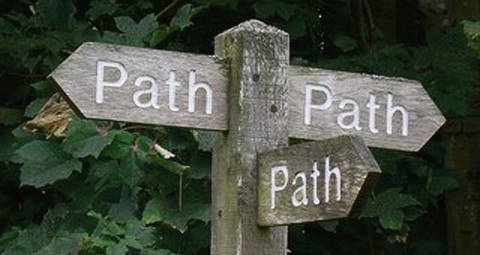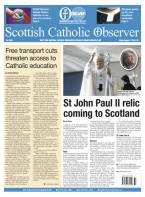July 6 | ![]() 0 COMMENTS
0 COMMENTS ![]() print
print

Endings, beginnings and the call to stay on the right path
This week's editorial
Endings, new beginnings and retracing footsteps on traditionally travelled paths were reccurring themes in the Catholic community in Scotland this week that spoke of, and to, the need for New Evangelisation, renewal and the future of the Faith in Scotland.
Two new priests were ordained for St Andrews and Edinburgh on Saturday, the same day as the Vatican officially accepted the resignation of Bishop Vincent Logan of Dunkeld on health grounds and as details of challenges Galloway Diocese faces in the future came to light. Then, on Sunday, Cardinal Keith O’Brien joined pilgrims at the beginning of their walk along the trail of the ancient pilgrimage from Edinburgh to St Andrews—The Way of St Andrews— leading pilgrims to the New Dawn in Scotland Conference.
On the subject of new beginnings, Professor John Haldane of St Andrews University has called for a ‘Catholic intellectual renaissance’ to save religious liberties from aggressive secularism. He made the appeal in his keynote speech in Edinburgh at the 40th meeting of general secretaries of the Council of European Bishops’ Conferences.
Religious freedom, Faith leadership and the difficult path Christians face today were also challenges that Cardinal O’Brien raised at Saturday’s ordinations, the general secretaries event and the New Dawn Conference.
The cardinal told newly ordained Frs Jeremy Milne and John Deighan that they should ‘always remember the example of the Good Shepherd’ and follow His example to serve and ‘seek out those who are lost.’
While God has no beginning and no end, our Church faces a series of beginnings and endings but answers can be found among the Faithful, by staying on the path we are travelling along, and among the ‘lost,’ by walking traditionally travelled paths once again.
On the subject of walks, and amidst the tragic example from Kenya of the harm people can do to each other, it is comforting to be reminded that people of different faiths, and of none, are in the main inherently good. The modern-day charity walk is both a reminder that people want to be proactive for a good cause and a nod to the public witness and demonstration of Faith of the traditional pilgrimage, such as the aforementioned trail from Edinburgh to St Andrews and the Lourdes plans of many Scottish dioceses.
And while some see events such as Orange marches as a mockery of the pilgrimage walk, could imitation be the sincerest form of flattery?
No matter how archaic and distasteful this historic remnant of religious divide in our society is, current campaigns against ‘Orange walks’ must not be used for political ends to distract us from pressing issues, such as the July 10 Scottish Cabinet decision on marriage law. While each issue has its place and merits attention, the bigger picture is still emerging: The future of Christianity in our society.











